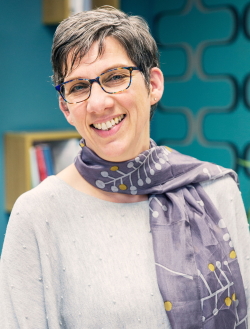Sarah is internationally recognised for her work in developing innovative approaches to ensure that decision-makers have access to the best evidence for taking organisations, policies and practices forward. She has done this through:
- creating channels for getting research into the real world (at the Centre for Research on Families and Relationships)
- broadening understanding of the interaction between research, policy and practice (through work with UNICEF, What Work Scotland and other research); and
- working alongside organisations to use evidence for improving services for the families and communities they serve (with Healthcare Improvement Scotland, Starcatchers, The Scottish Book Trust, Shelter Scotland and others).
Sarah has pioneered a participatory approach to using contribution analysis to understand and achieve outcomes.
Photo by Malin Widstrand Photography
Sarah’s publications
With case studies from health, community, research, international development and social care, this book shows that with the right tools and techniques, public services can track their contribution to social change and become more efficient and effective.
Ailsa Cook, Sarah Morton, Flora Henderson. Evaluation and Program Planning, Volume 97. Understanding the dynamic relationship between service providers and the people who use their services is key to effective evaluation. This paper presents a practical approach to embedded evaluation that can be used by services to interrogate assumptions about relationships. The approach includes a simple framework for developing theories of change that centres relational aspects of the change process. This framework is complemented by a structured approach to surfacing risks and assumptions. Using the example of the evaluation of Future Pathways, a new and ground breaking service provided to people who experienced abuse or neglect as children In Care in Scotland, the paper describes how this approach was used in practice.
Sarah Morton. Evaluation, Volume 24, Issue 4, Pages 405–419
Sarah Morton, Suzanne Wilson, Sheila Inglis, Karen Ritchie and Ann Wales. BMC Health Services Research, 2018, Volume 18, Number 1, Page 1
Sarah Morton. Evidence & Policy: A Journal of Research, Debate and Practice, Volume 14, Number 1, pp. 155-167(13). Policy Press
David Phipps and Sarah Morton. Evidence & Policy: A Journal of Research, Debate and Practice, Volume 9, Number 2, pp. 255-265(11). Policy Press. (Please note paper is not open access)
Sarah Morton and Tabitha Casey. University of Edinburgh.
Sarah Morton. Child Abuse & Neglect, Volume 74, Pages 111-114. (Please note paper is not open access)
Cara Blaisdell, Harriet Waugh, Sarah Morton and Marsha Scott, based on a project with Sarah Morton. The Centre for Research on Families and Relationships Research Briefing 79.
Conducted by Starcatchers with the support of Sarah Morton.
Sarah Morton and Jennie Flemming. Centre for Research on Families and Relationships Research Briefing 66.
Opinion piece for Apolitical
